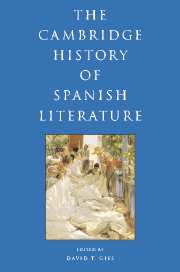Book contents
- Frontmatter
- I INTRODUCTION
- II HISTORY AND CANONICITY
- III THE MEDIEVAL PERIOD
- IV EARLY MODERN SPAIN: RENAISSANCE AND BAROQUE
- 7 Renaissance and Baroque: continuity and transformation in early modern Spain
- 8 Religious literature in early modern Spain
- 9 Renaissance poetry
- 10 The antecedents of the novel in sixteenth-century Spain
- 11 Miguel de Cervantes
- 12 The making of Baroque poetry
- 13 The development of national theatre
- 14 Lope Félix de Vega Carpio
- 15 Pedro Calderón de la Barca
- 16 Didactic prose, history, politics, life writing, convent writing, Crónicas de Indias
- V THE ENLIGHTENMENT AND NEOCLASSICISM
- VI THE FORGING OF A NATION: THE NINETEENTH CENTURY
- VII THE MODERN, MODERNISMO, AND THE TURN OF THE CENTURY
- VIII TWENTIETH-CENTURY SPAIN AND THE CIVIL WAR
- IX IN AND OUT OF FRANCO SPAIN
- X POST-FRANCO SPANISH LITERATURE AND FILM
- Bibliography
- Index
- References
12 - The making of Baroque poetry
from IV - EARLY MODERN SPAIN: RENAISSANCE AND BAROQUE
Published online by Cambridge University Press: 28 March 2008
- Frontmatter
- I INTRODUCTION
- II HISTORY AND CANONICITY
- III THE MEDIEVAL PERIOD
- IV EARLY MODERN SPAIN: RENAISSANCE AND BAROQUE
- 7 Renaissance and Baroque: continuity and transformation in early modern Spain
- 8 Religious literature in early modern Spain
- 9 Renaissance poetry
- 10 The antecedents of the novel in sixteenth-century Spain
- 11 Miguel de Cervantes
- 12 The making of Baroque poetry
- 13 The development of national theatre
- 14 Lope Félix de Vega Carpio
- 15 Pedro Calderón de la Barca
- 16 Didactic prose, history, politics, life writing, convent writing, Crónicas de Indias
- V THE ENLIGHTENMENT AND NEOCLASSICISM
- VI THE FORGING OF A NATION: THE NINETEENTH CENTURY
- VII THE MODERN, MODERNISMO, AND THE TURN OF THE CENTURY
- VIII TWENTIETH-CENTURY SPAIN AND THE CIVIL WAR
- IX IN AND OUT OF FRANCO SPAIN
- X POST-FRANCO SPANISH LITERATURE AND FILM
- Bibliography
- Index
- References
Summary
Disapproval of Baroque flourishes was inscribed into modern Spanish literary historiography by Marcelino Menéndez y Pelayo at the end of the nineteenth century, so indelibly that vigorous campaigns from later readers were required to elevate major Baroque poets to the canonical status they enjoy in our time. Meeting on the tercentenary of his death, a brilliant roster of young Spanish writers adopted Luis de Góngora y Argote (1561–1627) as patron saint of their attempts to renovate poetic discourse. Because many of these twentieth-century poets – Federico García Lorca, Pedro Salinas, Jorge Guillén, Dámaso Alonso, Gerardo Diego – contributed significantly to criticism, historiography, and text diffusion, their admiration not only canonized Góngora, but also defined the standards by which seventeenth-century poets would be judged. It is one of the ironies of literary history that the very poets who revered the Baroque master’s devotion to language freed from the strictures of conventional logic should also have contributed, over the longer term, to limiting appreciation of his work. In subsequent assessments, Góngora’s verse is frequently cited as proof of the definitive exhaustion of classical and Petrarchan imitation. In this view, his brilliant images and dazzling verbal pyrotechnics not only say nothing new: tied to the sensory and the superficial, they seem to spin over an abyss of nothingness. If Baroque verse was “saved” by the creed of linguistic freedom, it was by the same means doomed to irrelevance. The present chapter explores the phenomenon of Baroque poetry, considering the work of major poets in the multiple contexts of literary history, poetics, and the cultural setting of poetic practice, from the last decades of the sixteenth century through the seventeenth.
- Type
- Chapter
- Information
- The Cambridge History of Spanish Literature , pp. 222 - 237Publisher: Cambridge University PressPrint publication year: 2005
References
- 2
- Cited by



